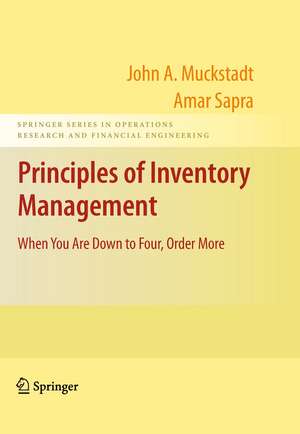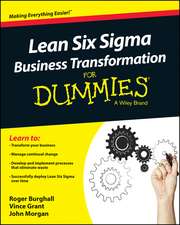Principles of Inventory Management: When You Are Down to Four, Order More: Springer Series in Operations Research and Financial Engineering
Autor John A. Muckstadt, Amar Sapraen Limba Engleză Hardback – 23 dec 2009
Principles of Inventory Management begins with an introductory chapter in which the basics of inventory systems and mathematical assumptions for all models are grouped together. The text is presented in a way such that each section can be read independently, and so the order in which the reader approaches the book can be inconsequential. It contains both deterministic and stochastic models along with algorithms that can be employed to find solutions to a variety of inventory control problems.
Key topics include:
* Economic order quantity (EOQ) model
* Power-of-two policies
* Dynamic lot sizing
* Single and multi-period stochastic models
* Echelon-based approaches
* Multi-echelon systems
* Single and multi-item models.
With exercises at the end of each chapter and a clear, systematic exposition, this textbook will appeal to advanced undergraduate and first-year graduate students in operations research, industrial engineering, and quantitative MBA programs. It also serves as a reference for professionals in both industry and government worlds. The prerequisite courses include introductory optimization methods, probability theory (non-measure theoretic), and stochastic processes.
| Toate formatele și edițiile | Preț | Express |
|---|---|---|
| Paperback (1) | 394.87 lei 6-8 săpt. | |
| Springer – 23 aug 2016 | 394.87 lei 6-8 săpt. | |
| Hardback (1) | 391.42 lei 38-44 zile | |
| Springer – 23 dec 2009 | 391.42 lei 38-44 zile |
Din seria Springer Series in Operations Research and Financial Engineering
- 13%
 Preț: 355.75 lei
Preț: 355.75 lei - 17%
 Preț: 370.05 lei
Preț: 370.05 lei - 15%
 Preț: 365.76 lei
Preț: 365.76 lei - 17%
 Preț: 363.08 lei
Preț: 363.08 lei -
 Preț: 347.47 lei
Preț: 347.47 lei -
 Preț: 497.00 lei
Preț: 497.00 lei -
 Preț: 356.91 lei
Preț: 356.91 lei - 19%
 Preț: 575.59 lei
Preț: 575.59 lei - 15%
 Preț: 638.43 lei
Preț: 638.43 lei - 18%
 Preț: 740.57 lei
Preț: 740.57 lei - 18%
 Preț: 945.30 lei
Preț: 945.30 lei - 20%
 Preț: 639.28 lei
Preț: 639.28 lei -
 Preț: 384.48 lei
Preț: 384.48 lei - 23%
 Preț: 732.07 lei
Preț: 732.07 lei -
 Preț: 407.98 lei
Preț: 407.98 lei - 18%
 Preț: 1395.63 lei
Preț: 1395.63 lei -
 Preț: 358.39 lei
Preț: 358.39 lei - 20%
 Preț: 549.58 lei
Preț: 549.58 lei - 18%
 Preț: 737.43 lei
Preț: 737.43 lei - 15%
 Preț: 660.37 lei
Preț: 660.37 lei -
 Preț: 411.67 lei
Preț: 411.67 lei -
 Preț: 391.02 lei
Preț: 391.02 lei - 18%
 Preț: 898.13 lei
Preț: 898.13 lei -
 Preț: 405.06 lei
Preț: 405.06 lei - 15%
 Preț: 637.28 lei
Preț: 637.28 lei -
 Preț: 495.84 lei
Preț: 495.84 lei - 19%
 Preț: 526.97 lei
Preț: 526.97 lei -
 Preț: 391.02 lei
Preț: 391.02 lei -
 Preț: 392.97 lei
Preț: 392.97 lei - 15%
 Preț: 538.61 lei
Preț: 538.61 lei - 15%
 Preț: 880.15 lei
Preț: 880.15 lei - 24%
 Preț: 831.85 lei
Preț: 831.85 lei - 18%
 Preț: 837.15 lei
Preț: 837.15 lei - 18%
 Preț: 801.65 lei
Preț: 801.65 lei - 19%
 Preț: 529.48 lei
Preț: 529.48 lei - 15%
 Preț: 592.77 lei
Preț: 592.77 lei
Preț: 391.42 lei
Nou
Puncte Express: 587
Preț estimativ în valută:
74.91€ • 77.92$ • 61.84£
74.91€ • 77.92$ • 61.84£
Carte tipărită la comandă
Livrare economică 10-16 aprilie
Preluare comenzi: 021 569.72.76
Specificații
ISBN-13: 9780387244921
ISBN-10: 0387244921
Pagini: 360
Ilustrații: XVIII, 339 p.
Greutate: 0.82 kg
Ediția:2010
Editura: Springer
Colecția Springer
Seria Springer Series in Operations Research and Financial Engineering
Locul publicării:New York, NY, United States
ISBN-10: 0387244921
Pagini: 360
Ilustrații: XVIII, 339 p.
Greutate: 0.82 kg
Ediția:2010
Editura: Springer
Colecția Springer
Seria Springer Series in Operations Research and Financial Engineering
Locul publicării:New York, NY, United States
Public țintă
ResearchCuprins
Inventories Are Everywhere.- EOQ Model.- Power-of-Two Policies.- Dynamic Lot Sizing with Deterministic Demand.- Single-Period Models.- Inventory Planning over Multiple Time Periods: Linear-Cost Case.- Background Concepts: An Introduction to the ( #x2212; 1, ) Policy under Poisson Demand.- A Tactical Planning Model for Managing Recoverable Items in Multi-Echelon Systems.- Reorder Point, Lot Size Models: The Continuous Review Case.- Lot Sizing Models: The Periodic Review Case.
Recenzii
From the reviews:
“This book on inventory management is based on a collection of lectures at Cornell University and consists of 10 chapters. … The book has been written in a form so that sections can be mostly independently read. Each chapter finishes with some exercises. This textbook is particularly suitable for graduate students which are familiar with basic optimization methods, probability theory and stochastic processes. In addition, it can also be used by practitioners as a reference tool.” (Frank Werner, Zentralblatt MATH, Vol. 1186, 2010)
“This book on inventory management is based on a collection of lectures at Cornell University and consists of 10 chapters. … The book has been written in a form so that sections can be mostly independently read. Each chapter finishes with some exercises. This textbook is particularly suitable for graduate students which are familiar with basic optimization methods, probability theory and stochastic processes. In addition, it can also be used by practitioners as a reference tool.” (Frank Werner, Zentralblatt MATH, Vol. 1186, 2010)
Textul de pe ultima copertă
Inventories are prevalent everywhere in the commercial world, whether it be in retail stores, manufacturing facilities, government stockpile material, Federal Reserve banks, or even your own household. This textbook examines basic mathematical techniques used to sufficiently manage inventories by using various computational methods and mathematical models. Such models discussed include: EOQ model and extensions, power-of-two models, single and multi-period models, probabilistic lot sizing models, multi-echelon stochastic models, Laplace and Normal demand models, exact Poisson model, and many more.
Principles of Inventory Management begins with an introductory chapter in which the basics of inventory systems and mathematical assumptions for all models are grouped together. The text is presented in a way such that each section can be read independently, and so the order in which the reader approaches the book can be inconsequential. It contains both deterministic and stochastic models along with algorithms that can be employed to find solutions to a variety of inventory control problems.
Key topics include:
* Economic order quantity (EOQ) model
* Power-of-two policies
* Dynamic lot sizing
* Single and multi-period stochastic models
* Echelon-based approaches
* Multi-echelon systems
* Single and multi-item models
With exercises at the end of each chapter and a clear, systematic exposition, this textbook will appeal to advanced undergraduate and first-year graduate students in operations research, industrial engineering, and quantitative MBA programs. It also serves as a reference for professionals in both industry and government worlds. The prerequisitecourses include introductory optimization methods, probability theory (non-measure theoretic), and stochastic processes.
Principles of Inventory Management begins with an introductory chapter in which the basics of inventory systems and mathematical assumptions for all models are grouped together. The text is presented in a way such that each section can be read independently, and so the order in which the reader approaches the book can be inconsequential. It contains both deterministic and stochastic models along with algorithms that can be employed to find solutions to a variety of inventory control problems.
Key topics include:
* Economic order quantity (EOQ) model
* Power-of-two policies
* Dynamic lot sizing
* Single and multi-period stochastic models
* Echelon-based approaches
* Multi-echelon systems
* Single and multi-item models
With exercises at the end of each chapter and a clear, systematic exposition, this textbook will appeal to advanced undergraduate and first-year graduate students in operations research, industrial engineering, and quantitative MBA programs. It also serves as a reference for professionals in both industry and government worlds. The prerequisitecourses include introductory optimization methods, probability theory (non-measure theoretic), and stochastic processes.
Caracteristici
More mathematical than some other texts in this field, with a good balance between simplicity and rigour Has a clear, systematic exposition with detailed examples and exercises at the end of each chapter A wellorganized textbook where each section can be read independently Contains 50+ figures Includes supplementary material: sn.pub/extras










